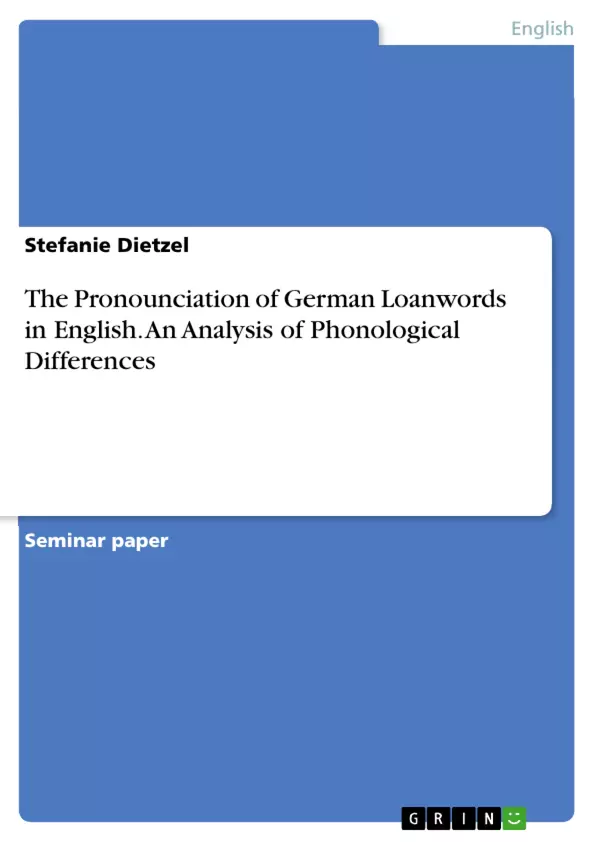This paper will present the most frequently used German loan words in English and focus on their pronunciation. First, a list of items will represent my data collection via the Oxford English Dictionary. It will refer to the study of the etymology of the words. After that, the paper will show the results of the recording of native speakers of English. Then the words will be analysed with respect to phonetic realization. Finally, I will emphasise the main differences between English and German phonology.
“English does not have many German loanwords – at least not many of common use – but those it does have are a rather more mixed bunch than such stereotypic lists might imply.” (Stubbs 1998:19) With his statement, Stubbs refers to those linguists who claim that the small number of German loanwords in English only originate from specific historical contexts. In his paper, he wants to revise this belief and show that also more general terms are adapted from German to English.
Inhaltsverzeichnis (Table of Contents)
- 1 INTRODUCTION
- 2 CONTRASTIVE PHONOLOGY OF GERMAN AND ENGLISH
- 2.1 Consonants
- 2.2 Monophthongs
- 2.3 Diphthongs
- 3 GERMAN LOANWORDS IN ENGLISH
- 3.1 Definition of Loanwords
- 3.2 The Context and History of German Loanwords in English
- 3.3 Classification of Loanwords
- 4 METHODOLOGY, DATA COLLECTION AND HYPOTHESIS
- 4.1 The Most Frequent Borrowings
- 4.2 Hypothesis
- 5 ANALYSIS OF PHONOLOGICAL DIFFERENCES
- 5.1 Results of Audio Recording
- 5.2 Analysis
- 5.2.1 Consonantal differences
- 5.2.2 Differences among Monophthongs
- 5.2.3 Differences among Diphthongs
- 6 CONCLUSION
Zielsetzung und Themenschwerpunkte (Objectives and Key Themes)
The main objective of this paper is to analyze the pronunciation of frequent German loanwords in English, focusing on the influence of English phonology on the realization of these loanwords by native speakers of English. The paper aims to demonstrate how the phonological differences between English and German affect the pronunciation of German loanwords in English.
- Contrastive phonology of German and English
- The history and context of German loanwords in English
- The pronunciation of German loanwords in English
- The influence of English phonology on the realization of German loanwords
- The analysis of phonological differences between German and English in terms of consonants, monophthongs and diphthongs
Zusammenfassung der Kapitel (Chapter Summaries)
The first chapter introduces the topic of German loanwords in English, highlighting the existing debate on their prevalence and origin. It presents the main focus of the paper, which is to analyze the pronunciation of German loanwords in English by native speakers of English. The chapter also outlines the methodology used in the research, including the collection of data from different corpora and pronunciation dictionaries, as well as the recording of native speakers.
The second chapter provides an overview of the main phonological differences between English and German, including their consonant and vowel inventories. This chapter establishes the foundation for understanding how these differences might impact the pronunciation of German loanwords in English.
The third chapter focuses on the definition and classification of loanwords, highlighting their historical context and the impact of German on the English vocabulary. It also includes a detailed discussion on the different types of loanwords that have been adopted into English.
Schlüsselwörter (Keywords)
This paper focuses on the phonology of German loanwords in English, exploring the influence of English phonology on their pronunciation. Key themes include contrastive phonology, German loanwords, pronunciation, English phonology, and data analysis. The research delves into the differences in consonant and vowel systems between the two languages, examining how these discrepancies affect the realization of German loanwords in English by native speakers.
Frequently Asked Questions
What are the most common German loanwords used in the English language?
The paper analyzes frequently used items collected via the Oxford English Dictionary, covering both historical contexts and general everyday terms adopted from German.
How does English phonology affect the pronunciation of German loanwords?
Native English speakers often adapt German sounds to the English phonetic system, leading to significant differences in the realization of consonants, monophthongs, and diphthongs.
What is the focus of contrastive phonology in this study?
The study compares the sound inventories of both languages to explain why certain German words are pronounced differently when integrated into English speech.
Is it true that English has very few German loanwords?
While some linguists claim the number is small, this research supports the view that German influence is more diverse and includes many common use terms beyond specific historical contexts.
What methodology was used to analyze the pronunciation?
The research involved recording native English speakers and analyzing their phonetic realization of loanwords compared to original German phonology and standard dictionary entries.
- Citation du texte
- Stefanie Dietzel (Auteur), 2007, The Pronounciation of German Loanwords in English. An Analysis of Phonological Differences, Munich, GRIN Verlag, https://www.grin.com/document/133404



